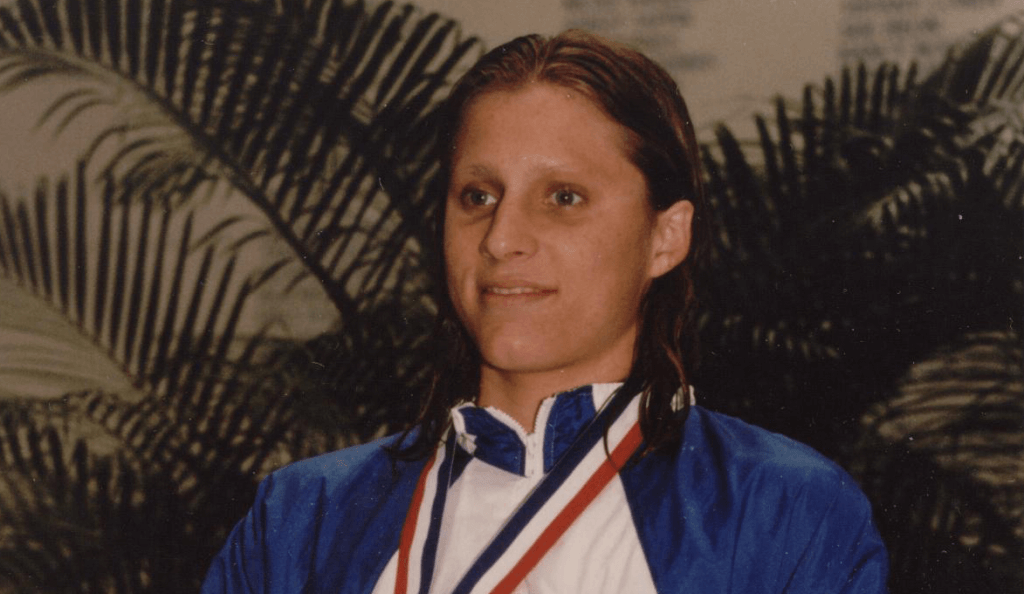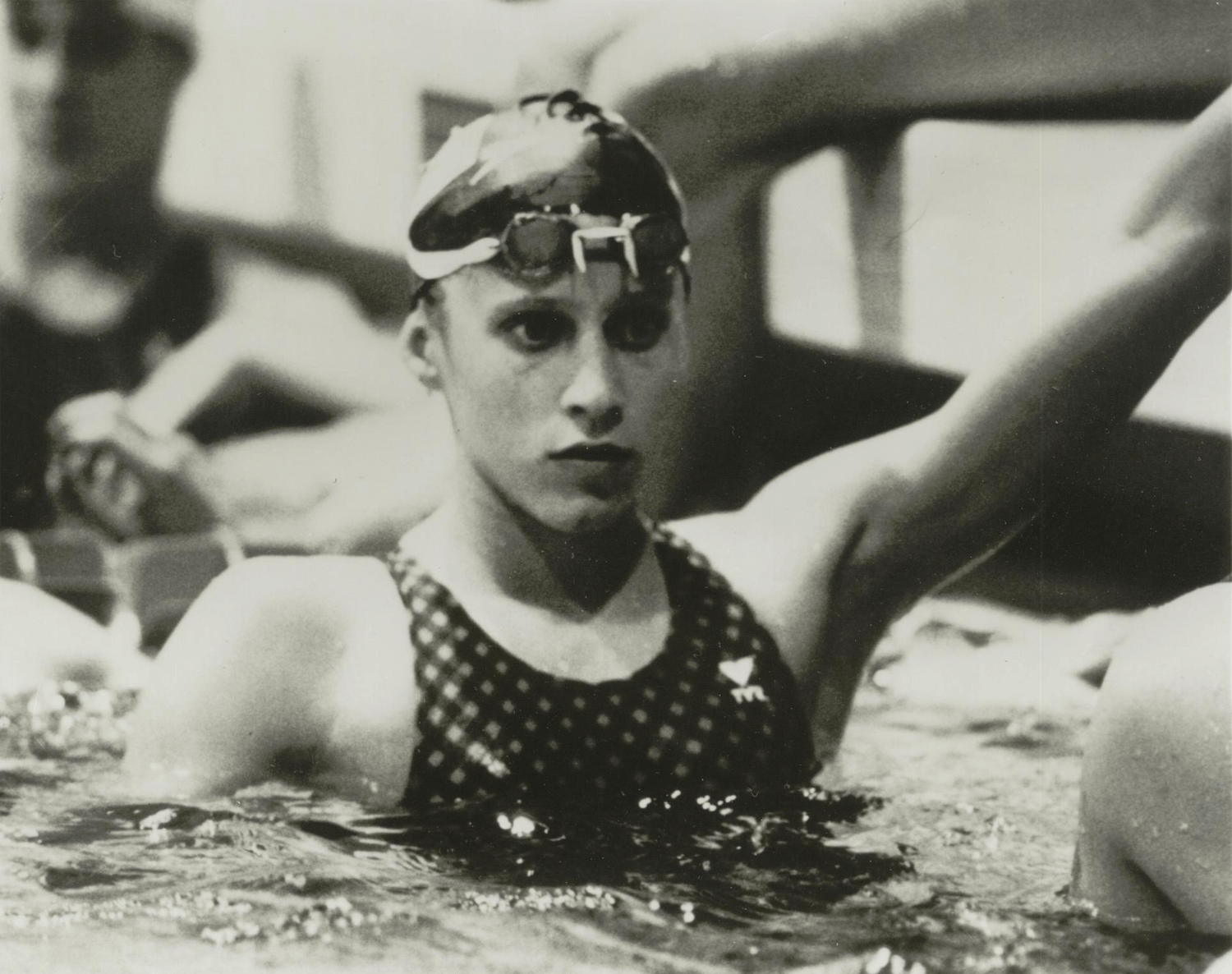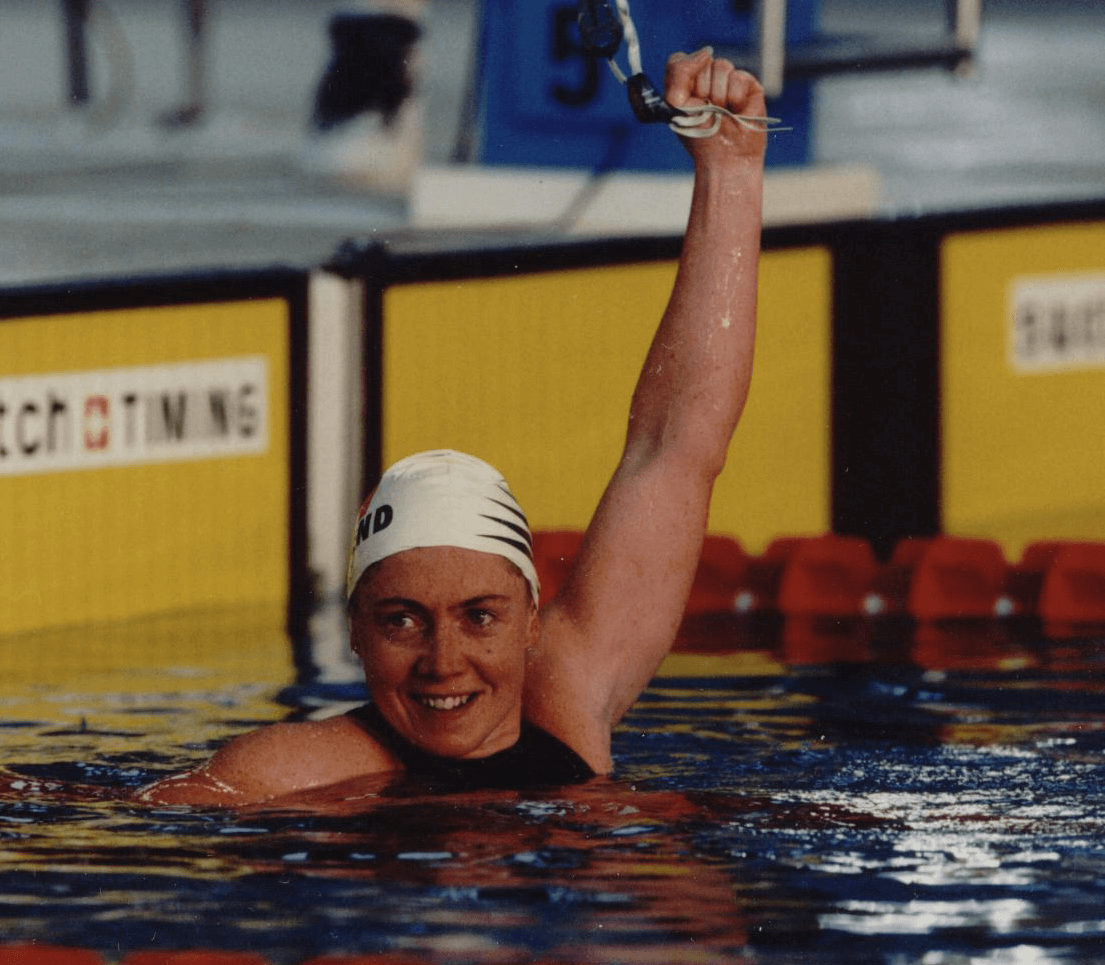1996 Olympian Allison Wagner Wants Athletes To Speak Out Against Doping

By David Rieder.
As Lilly King and Yulia Efimova exchanged finger wags before they faced off in the women’s 100 breast at the Olympic Games, 1996 Olympic silver medalist Allison Wagner felt a bit of déjà vu.
After Efimova won the first semifinal and King the second, Wagner was watching on television as King explained to the world why she believed Efimova—twice suspended for positive drug tests—did not deserve to be competing at the Olympic Games.
It was when Wagner read that King had been called “unsportsmanlike” for speaking out that Wagner decided to do the same. After all, Wagner knows exactly what it feels like to compete against someone who has taken performance-enhancing substances.

Allison Wagner; Photo Courtesy: USA Swimming
Wagner won a pair of silver medals in the 200 and 400 IM at the World Championships in Rome in 1994, both times finishing behind Chinese swimmers (Lü Bin and Dai Guohong, respectively). China won 12 of 16 women’s gold medals at that meet, drawing heavy suspicion of performance-enhancing drug use—later proven to be true.
Two years later, Wagner won the silver medal in the 400 IM at the Atlanta Olympics, coming in three seconds behind gold medalist Michelle Smith of Ireland. Smith came out of nowhere to take home four medals from Atlanta, three of them gold. While swimming in an outside lane, she clocked 4:39.18 to win the 400 IM, almost twenty seconds quicker than the time she had swum four years earlier at the Games in Barcelona (4:58.94).

Michelle Smith; Photo Courtesy: Tim Morse (1996)
With that massive improvement, eyebrows were raised as to the legitimacy of Smith’s times, and Wagner, Janet Evans and others were among those with serious doubts.
“It was evident to me and everybody else I talked to that she was suspect,” Wagner said about drug use during the 1996 Olympic Games.
After years of racing the Chinese women, Wagner had learned the telltale signs of a doper—facial hair, deeper voices, changing muscle complexion, actual ring marks from where the injections had been given and association with proven violators.
But Wagner had to wait two years for her concerns about Smith to be validated. In 1998, Smith was banned four years for tampering with her urine sample with alcohol. Later on, it was determined that that sample as well as two previous ones had included traces of androstenedione, a precursor to testosterone.
Still, Wagner did not feel vindicated—she felt betrayed.
“I was disappointed it took that long,” Wagner said. “She tampered with her sample. There’s no way an athlete should be able to do that if anti-doping standards and procedures are upheld.”
Wagner explained that an anti-doping agent is to remain by the side of an athlete being tested throughout the entire process of an out-of-competition test. Why did that not happen for Smith, and why had she not been banned earlier if traces of a steroid had already been found?
Smith was out, and she would never return to the sport. But she took with her the four medals from Atlanta into retirement and never had to give them back. Her samples from the Olympics were tested in 1996 and came back clean, and she continued—and, in fact, continues to this day—to deny that she ever used illegal drugs. But even with more modern testing methods now available, those samples have not been looked at again.
“I think when it’s proven that the athletes doped, those races should be reviewed,” Wagner said. “Those athletes’ [samples] should be retested.”
Just like many other cheated out of their rightful place in history, nothing of the sort ever happened. Wagner still has the silver, having never heard from anyone at the International Olympic Committee about the situation.
Fast forward twenty years, and performance-enhancing drugs remain a major presence in swimming. Just two months ago, the entire Russian swim team competed at the Olympics in Rio despite the McLaren report outlining the country’s state-sponsored doping system.
And what happens when an athlete gets caught cheating and tests positive? Two-year ban, right? Well, not so fast. China’s Sun Yang was out for just three months after a positive test in 2014, and Efimova was suspended 16 months in 2013 so that she would be eligible just in time to qualify for the 2015 World Championships—set to be held in Russia, of all places.
“I think people forget this is a sport, a game,” Wagner said. “You have to follow the rules. You can’t just make up a new turn that breaks the rules and expect to not get disqualified.
“I want to see doping regulations treated like rules regarding stroke in swimming. I think [anti-doping] decisions seem more arbitrary and more influenced by other factors besides the standards that are supposed to be in place no matter what.”
More than anything else, Wagner wants to start a real dialogue about doping in sports and help foster an environment where athletes will not be afraid to speak out when they believe illegal substances are in use.
“These drugs, they don’t work like caffeine—they’re not short-term drugs, and they can affect you for a very long time,” she said. “This is an issue that affects a lot of athletes, and they should be concerned if they truly are a team player.”
As much as the current situation depresses Wagner, she has some hope.
“I really think there is a way to stop it or at least chip away at it,” she said. “It really pains me to see athletes in the same shoes I was twenty years ago.”




For sure I want my medal from Atlanta 1996 – Men’s 200m Breaststroke it would have been my 3rd consecutive medal across 3 Olympic Games which had never and has to this day never been achieved. There is good history from CAS which saw the Russian Federation verses the IOC. The IOC made the initial disqualification due to a positive drugs test only to lose the case as they were negligent in court! The swimmer who took bronze even admitted taking performance enhancing drugs and it was proven in court the drug was of the highest classification to enhance performance so why was the swimmer reinstated? Because the independent expert could not conclude when ask in court ‘How much did the athletes performance improve’? A question that is certainly not answerable in terms of time or percentages!! The cheating swimmer has passed this world having died a couple of years back. What’s interesting is that the swimmer had never beaten me in all the years we raced other than in ATLANTA! I want my MEDAL and the IOC should make the call! Thank you for this post – Well done Allison and well done Lilly. Nick (Nick Gillingham MBE, FIOS, NGB Licensed Aquatics Professional, Performance Coach and Tutor/Coach Educator/Mentor).
Thanks for sharing, Nick. Just a messy situation with no end in sight, especially if the IOC sticks to its guns about not redistributing medals. The more of you that speak up, the better!
Perhaps it’s time for those who have been wronged by the IOC’s inability to fight for clean sport to join together and sue…I bet Allison Wagner and Shirley Babashoff would be great leaders to right the record books in the sport of swimming.
David, thanks for the reply, there have been a few interesting comments here, in particular the note from Maggie regarding taking ‘Legal Action’ stating… “Perhaps it’s time for those who have been wronged by the IOC’s inability to fight for clean sport to join together and sue…I bet Allison Wagner and Shirley Babashoff would be great leaders to right the record books in the sport of swimming”. I’m no ‘Lawyer’ but hey its not a bad idea. Power in the ranks of such a group could work especially financially as the monetary cost would be high. I actually employed legal support back in 1996 (and had some support from my national federation and the British Olympic Association) but in the end the IOC just chose to ignore all of our correspondence. They were negligent in CAS as they only forwarded minor abstracts of evidence to support their disqualification of the swimmer. What was ‘politically interesting’ and ‘wrong’ was that there were four Olympic Team members (across different sports) from Russia who were disqualified for the same ‘performance enhancing drug’ the two who won medals were reinstated and the two who did not win medals remained disqualified! To take legal action as a collective group of swimmers as one singular/recognised body, there would need to be an official merging, for example an “International Swimmers Union” with all constitutions in place, in this case the ISU could take action… ISU verses IOC. Again, I am really no expert, I just think this is how it could work, otherwise there would simply be lots of singular individuals (former swimmers) taking action against the IOC which would simply get lost in the post box again! Once more, thanks for the reply and to everyone who supports ‘Drug Free Clean Sport’ – Nick ~ (Former WR Holder – Mens 200m Breaststroke) ~
Athletes need to protect their sport!
@SBabashoff It was obvious Michelle Smith was doping and Alison was robbed! Keep fighting #Gator?
There’s something wrong in sports when Lilly King, speaks the truth as a clean athlete, Efimova drops a few tears, and suddenly people call King’s behavior unsportsmanlike. What?! I’m happy to see Allison Wagner speaking out as a clean athlete, who was robbed by someone who truly behaved in an “unsportsmanlike” manner. Maybe if more people speak out against cheating something will finally happen to these athletes that are doping.
Allison please continue to speak out…If you (not just Allison) have not yet seen the documentary ‘The Last Gold’ you should…LK I had no idea who you were before RIO…you are one of my hero’s of the Games…David/Brent props for continuing in Swimming World’s editorial support of the ‘Anti-Doping’ issues in our sport(s)!
With all of these obvious cheats getting away with it, I would have to conclude the IOC (if they are the responsible organization) is incompetent and impotent. This is totally unexceptable!! The East Germans, the Chinese and the other swimmers allowed to compete in these Games are frauds.